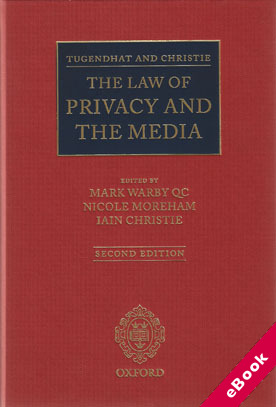
The device(s) you use to access the eBook content must be authorized with an Adobe ID before you download the product otherwise it will fail to register correctly.
For further information see https://www.wildy.com/ebook-formats
Once the order is confirmed an automated e-mail will be sent to you to allow you to download the eBook.
All eBooks are supplied firm sale and cannot be returned. If you believe there is a fault with your eBook then contact us on ebooks@wildy.com and we will help in resolving the issue. This does not affect your statutory rights.
The first edition of this book quickly established itself as the leading reference work on the rapidly developing law of privacy in England and Wales, and the specialist team of barristers from Five Raymond Buildings (the media, entertainment and human rights chambers) and expert academic foreign law contributors have now prepared a timely new edition.
Many of the contributors have appeared or advised in the leading cases which are shaping the law of privacy. The book considers how the law protects the publication of personal information without undermining the fundamental principle of freedom of expression.
Since the first edition was published the law of privacy has developed considerably. As predicted by the authors, a separate and distinct cause of action, known as "misuse of personal information" has been created, though its precise remit is still being defined by the courts. Alongside this new tort or equitable remedy, traditional causes of action (most notably breach of confidence) remain available to provide remedies for invasions of privacy.
The common law continues to be influenced by the competing rights under Articles 8 and 10 of the European Convention on Human Rights and its concurrent Strasbourg jurisprudence and, to a lesser extent, by application of the principles established in the Data Protection Act 1998. The case law is developing on a case by case basis, drawing on comparative legal and academic sources where appropriate. Against this background the debate as to whether Parliament should enact a general law of privacy rumbles on.
Although intended as a practitioners' guide to the law, this major work includes a consideration of comparative and international jurisprudence, as well as leading academic writings on the subject, in order to elaborate the principles upon which privacy rights are based.
These may helpfully guide the development of English law in the years ahead. The structure moves from the historical and contextual, through the academic and comparative, to the practical and developing law. At the heart of the book is an explanation of existing causes of action which may be used to protect personal privacy and practical advice on defences and remedies that may be available.
It is recognized that recent legislation, most notably the Data Protection Act 1998 and the Human Rights Act 1998, has had a significant impact on the law in this area and full consideration is given to their application. A vast range of important recent case law is also analysed, including Max Mosley v News Group Newspapers Ltd, the J.K Rowling case and Terry v Persons Unknown. The topic of super-injunctions is addressed as are the latest proposals for reform of the law in this rapidly-developing and highly controversial field.